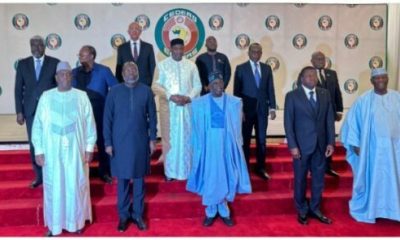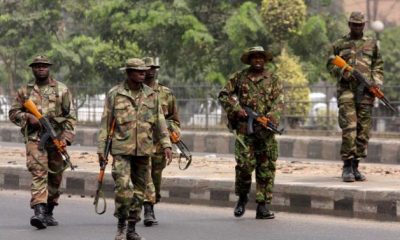
News
Former Rebel Leader Challenges Niger’s Military Coup Junta

Niger, a landlocked country in West Africa, is facing a political crisis after a military coup ousted its democratically elected president in July 2023. The coup has been widely condemned by the international community, but also supported by some of Niger’s neighbors.
However, there is a new force that is challenging the military coup leaders from within: a former rebel leader who has launched a resistance movement to restore democracy and constitutional order in Niger. Who is this man, and what are his motives and chances of success?

Read on to find out more about this fascinating and complex story.
RELATED:
Niger Coup: Why Nigerian Senators Rejected Tinubu’s Request for Troops Deployment

Northern Senators Frown at Military Action Against Niger Condemn Coup
How Niger Coup Shook Africa: The Inside Story of a Democracy Betrayed
The Background: Niger’s History of Rebellion and Democracy
Niger is a country that has a rich and diverse culture, history, and geography. It is also facing many challenges, such as poverty, insecurity, and political instability.
One of the most important issues in Niger is the Tuareg rebellion, which is a series of armed conflicts between the Tuareg people and the governments of Niger and Mali. The Tuareg are a nomadic ethnic group that live in the Sahara desert regions of northern Niger and Mali, as well as other neighboring countries. They have been marginalized and discriminated by the central authorities for decades, and have demanded more autonomy, recognition, and development for their regions.
The Tuareg rebellion has occurred several times in the past century, but the most recent ones took place from 1990 to 1995, from 2007 to 2009, and from 2012 to 2015. The causes of these rebellions include drought, famine, corruption, human rights violations, and the discovery of natural resources such as uranium and oil in the Tuareg areas. The rebellions have also been influenced by regional and international factors, such as the Libyan civil war, the rise of Islamist groups, and the involvement of foreign powers.
The Tuareg rebellion has had significant impacts on Niger and Mali, as well as the whole Sahel region. It has caused thousands of deaths, injuries, displacements, and human rights abuses. It has also disrupted the security, stability, and development of the countries involved. It has affected the mining and extraction of uranium and oil, which are vital for Niger’s economy. It has also increased the vulnerability of the region to terrorism, trafficking, and humanitarian crises.
The Tuareg rebellion has been addressed by various peace agreements and negotiations between the rebels and the governments, with the mediation of regional and international actors. However, these efforts have often failed to address the root causes of the conflict or to implement the agreed terms. The rebels have often split into different factions with different agendas and alliances. The governments have often lacked the political will or capacity to fulfill their commitments or to address the grievances of the Tuareg population.
Despite these challenges, Niger has also made some progress in its democratic transition. Since 1999, it has held several multiparty elections that have been relatively free and fair. It has also experienced peaceful transfers of power between different political parties and leaders. The most recent example was in February 2021, when Mohamed Bazoum won the presidential election with 55.75% of the votes, succeeding his ally Mahamadou Issoufou who had served two terms since 2011. Bazoum’s victory was seen as a milestone for Niger’s democracy and stability.
The Coup: How Niger’s Military Seized Power
However, Niger’s democracy was short-lived. On July 26, 2023, when a group of soldiers led by General Abdourahmane Tchiani staged a coup d’etat against Bazoum. They attacked his residence in Niamey, the capital city of Niger, arrested him and other senior officials, suspended the constitution, dissolved the government, and formed a junta called the National Council for Homeland Safeguard (CNSP).
The military coup leaders claimed that they acted to restore security and democracy in Niger, which had been threatened by corruption, mismanagement, and violence. They accused Bazoum of rigging the election, violating human rights, favoring his ethnic group, neglecting other regions, and failing to address the security threats posed by Islamist groups such as Boko Haram and Islamic State in West Africa Province (ISWAP) that have been operating in Niger’s borders with Nigeria , Chad , Mali , Burkina Faso , and Libya.
The military coup was met with mixed reactions from different actors. On one hand, it was condemned by many national and international actors, such as the Economic Community of West African States (ECOWAS), the African Union (AU), the United Nations (UN), France, and the United States (US). They called for the immediate release of Bazoum and other detained officials, and for the restoration of constitutional order and civilian rule. They also imposed sanctions on Niger, such as closing borders, suspending financial and commercial ties, cutting off electricity supply from Nigeria, and imposing a no-fly zone over Niger.
On the other hand, some actors have supported or defended the military coup leaders, such as Mali and Burkina Faso, which have also experienced military coups in recent years. They argued that Niger’s military coup was an internal affair that should not be interfered by external forces. They also warned that any military intervention against Niger could have negative consequences for regional stability and security. They called on the UN and AU to prevent any armed action against Niger, saying it would have unpredictable outcomes such as the break-up of ECOWAS, a humanitarian disaster, and a worsening security situation.
The Resistance: How a Former Rebel Leader is Fighting Back
One of the most prominent figures in the resistance movement is Rhissa Ag Boula, a former rebel leader and politician who has launched a new group called the Council of Resistance for the Republic (CRR). The CRR aims to reinstate Bazoum as president by any means necessary. It also supports ECOWAS and other international actors that seek to end military rule in Niger.
Ag Boula is not a stranger to Niger’s politics and conflicts. He played a leading role in the Tuareg rebellions in the 1990s and 2000s. He was one of the founders of the Nigerien Movement for Justice (MNJ), a rebel group that fought against the government of President Mamadou Tandja from 2007 to 2009. He was also involved in the Libyan civil war in 2011, where he supported Muammar Gaddafi against the NATO-backed rebels.
However, Ag Boula also participated in several peace processes and political transitions in Niger. He was integrated into the government under Bazoum and his predecessor Issoufou. He served as a minister of tourism, a presidential adviser, and a special envoy for peace and security in Africa. He also ran for president in 2016, but withdrew before the election.
Ag Boula’s decision to launch the CRR is motivated by his loyalty to Bazoum, his opposition to the military coup, and his aspiration for democracy and development in Niger. He said in a statement that Niger is “the victim of a tragedy orchestrated by people charged with protecting it”. He added that the CRR would use “any means necessary” to stop the military from denying the people of Niger their free choice.
The CRR claims to have several members from different political parties, civil society groups, ethnic communities, and regions of Niger. However, it has not revealed their names or numbers for security reasons. It has also not disclosed its strategy or tactics for achieving its goals. It has only said that it would make itself available to ECOWAS for any useful purpose.
The CRR faces many challenges and risks in its quest to challenge the coup leaders. It has to contend with the military’s superior firepower, resources, and control over most of the country. It has to mobilize support from different segments of society that may have different interests and views on the coup. It has to avoid provoking violence or instability that could worsen the humanitarian and security situation in Niger. It has to balance its cooperation with external actors with its respect for Niger’s sovereignty and independence.
What Lies Ahead for Niger
The situation in Niger remains uncertain and tense. The military coup leaders have not announced any roadmap or timeline for a return to civilian rule. They have also not released Bazoum or engaged in any dialogue with his supporters or mediators. The sanctions imposed on Niger have caused economic hardship and humanitarian crisis for its population. The security threats posed by Islamist groups and other armed actors have not diminished.
Niger is a country that deserves our attention and support and solidarity. It has a lot of potential and challenges that need to be addressed with respect and cooperation. I hope this article has given you some useful information about Niger’s history, politics, and current events.




























